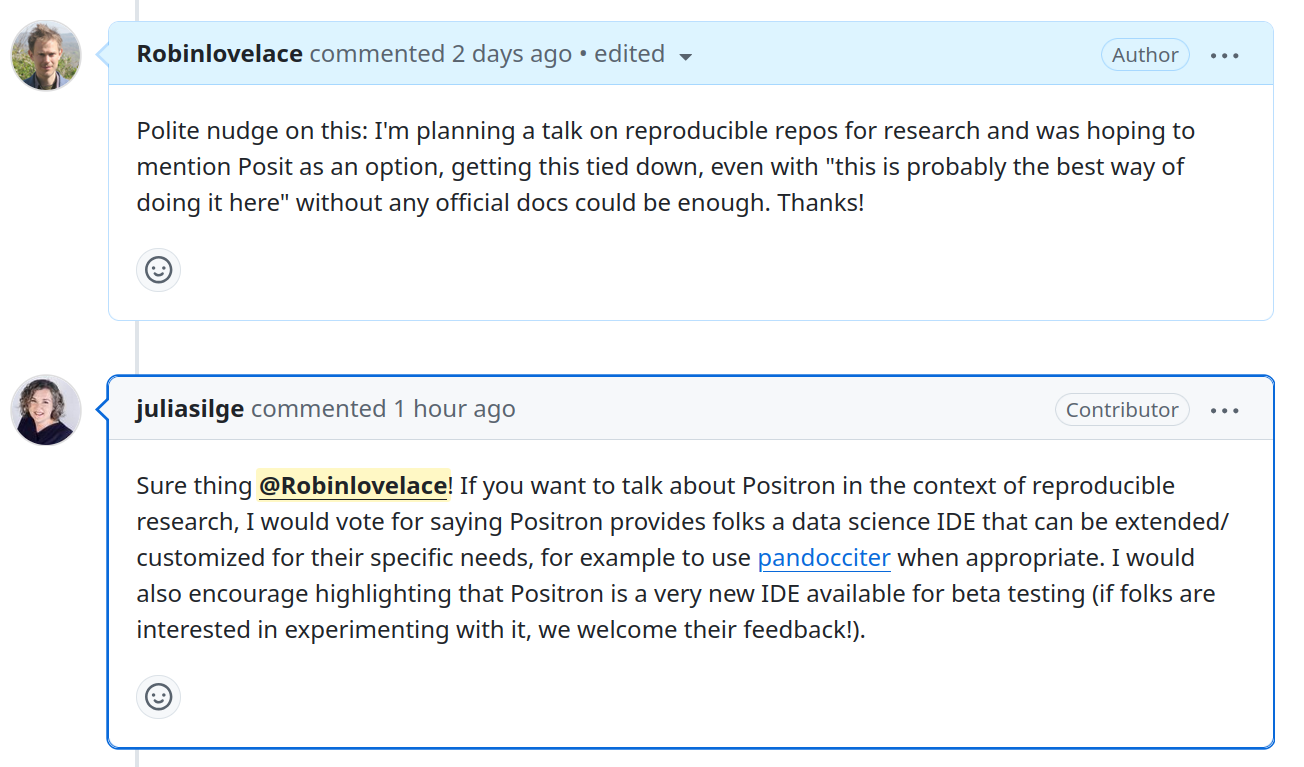Hello worldDeploying cross-language in high impact projects
January 23, 2025
Introduction
Contents
- Introduction
- Approaches to cross-language interoperability
- Containerisation
- Cross-language pain points
- Cross-language priorities
Case study for reference
The Network Planning Tool for Scotland
- Development version (branch
dev): nptscot.github.io - Stable version (branch
production): www.npt.scot
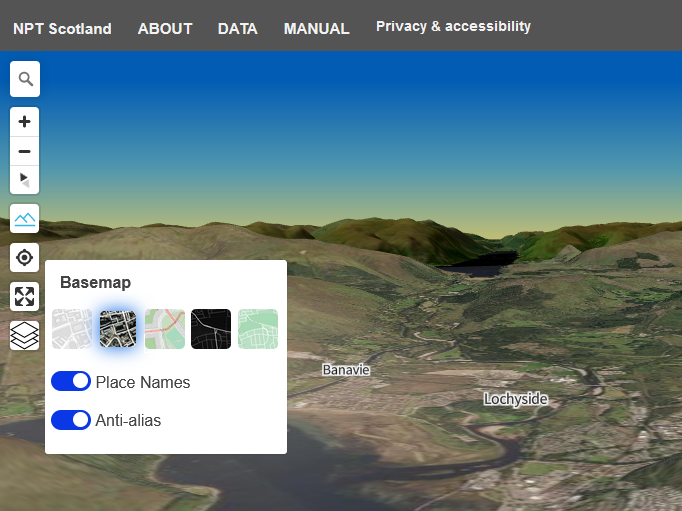
NPT stack
Backend: R + targets for ‘cross-language’ data pipeline workflow automation
- Relies on Rust crates
- Experiments with Python
Frontend: JS + MapLibre for visualisation
Progressive Web App (PWA)
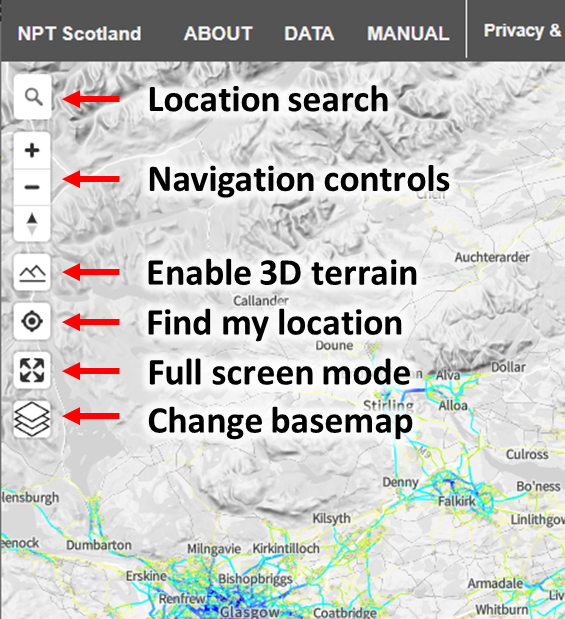
User interface
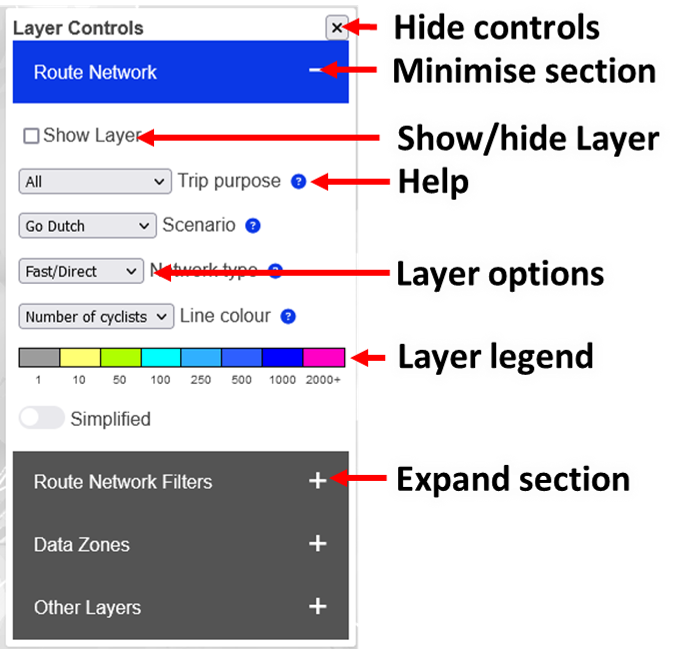
Layer Controls
Definitions
“Deploying”
- Code runs on more than one computer
- Results are published on a website that is maintained
- Project is “in production”
- Users: Hosted on a trusted and well-used website
- Performance: updates to ‘production’ planned and documented
- Money changing hands
- Expectations
Deploying the NPT
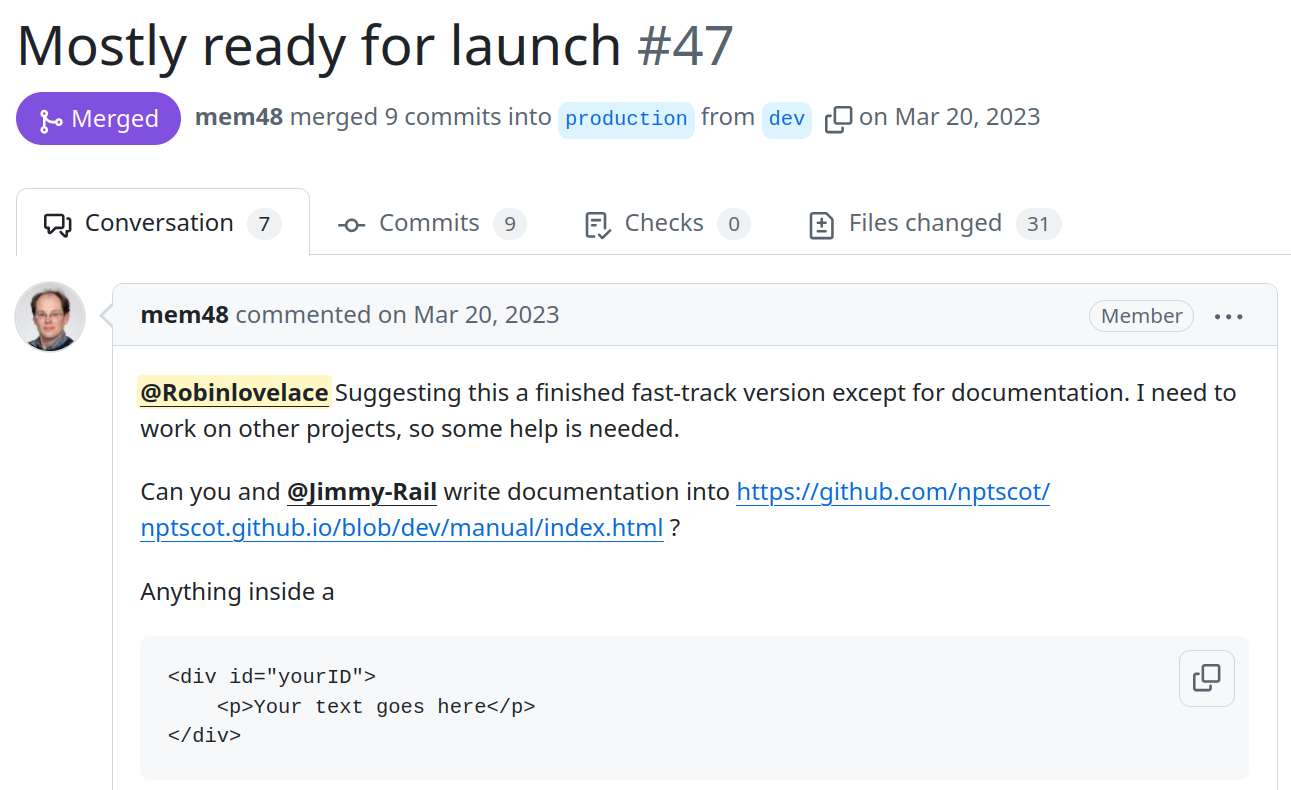
Deployment workflow of NPT
Based on workflow.yml file for GitHub actions.
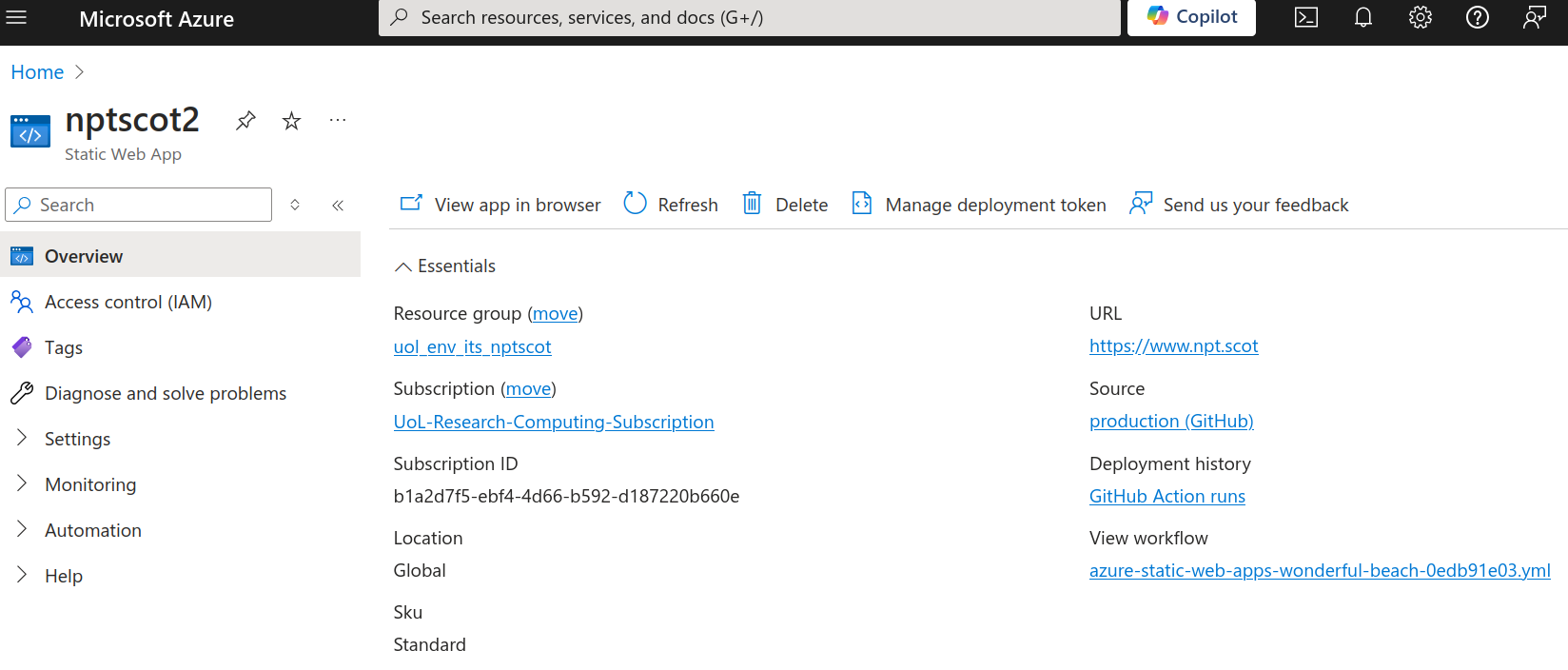
“High impact projects”
- Broadly: tangible change results from the work
- With measurable impact on environmental, social (or economic?) outcomes
- E.g. Reduction in greenhouse gas emissions
- E.g. better diets resulting in more DALYs
- Identifiable ‘pathway to impact’
- E.g. New methods -> new evidence -> investment in active travel more effective that it would have been otherwise -> more people cycling -> tangible benefits
- With measurable impact on environmental, social (or economic?) outcomes
Technical requirements for impact
- Users: The web application has users
- Scale: covers a large geographic area needs big data inputs
- Trusted: code review and multiple contributors
- User-friendly: if it’s going to have lots of users
- Future proof: technology needs to last a long time
- Community: needed to ensure it lasts
Why cross-language projects?
- Specific tool written in a particular language (
odjitter) - Required for ‘best of both worlds’ (JS for visualisation, R for statistical modelling)
- Having multiple implementations ensures robustness
- Aeroplane flight software has 3 implementations
- Redundancy common in mission-critical applications
Comparing approaches
Adding new languages
Source: github.com/Robinlovelace/opengeohub2023
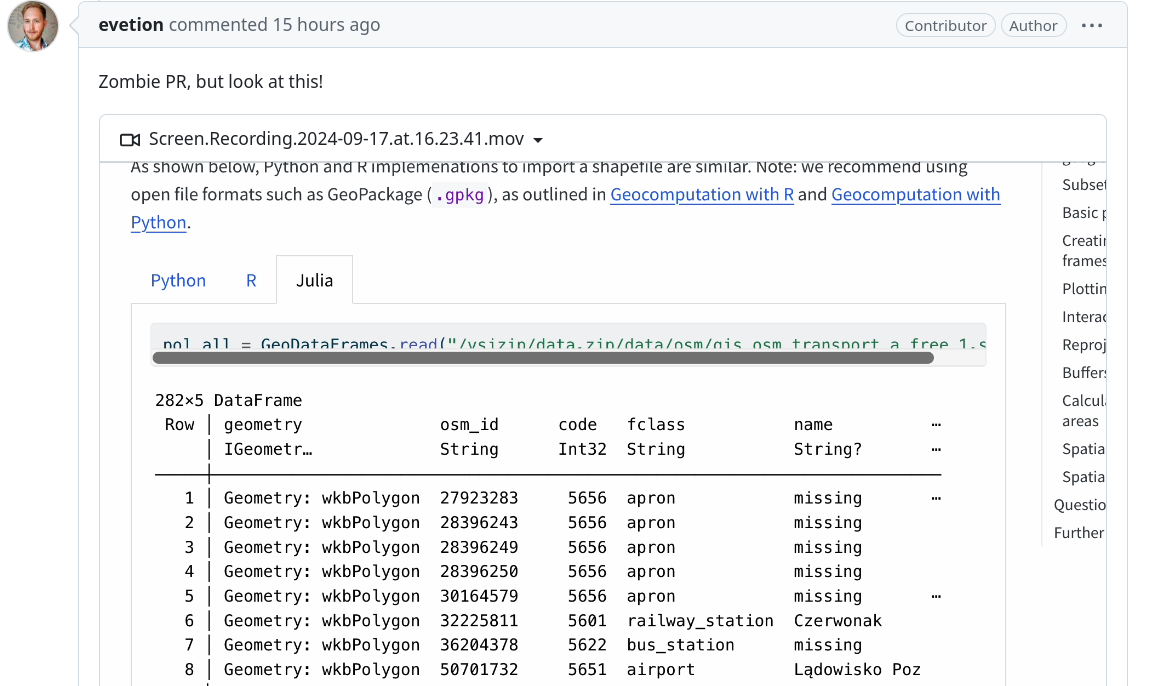
Practical session?
Approaches to cross-language projects
Checked boxes indicate approaches used in the NPT project.
Loose coupling
Example: odjitter R package
msg = glue::glue("{odjitter_location} jitter --od-csv-path {od_csv_path} \\
--zones-path {zones_path} \\
--zone-name-key {zone_name_key} \\
--origin-key {origin_key} \\
--destination-key {destination_key} \\
--subpoints-origins-path {subpoints_origins_path} \\
--subpoints-destinations-path {subpoints_destinations_path} \\
--disaggregation-key {disaggregation_key} \\
--disaggregation-threshold {disaggregation_threshold} \\
--rng-seed {rng_seed} \\
{deduplicate_pairs} \\
--output-path {output_path}")
if(show_command) {
message("command sent to the system:")
cat(msg)
}
system(msg)
res = sf::read_sf(output_path)Loose coupling
Example: qgisprocess R package
qgis_run <- function(args = character(), ..., env = qgis_env(), path = qgis_path()) {
if (is.null(path)) {
message(
"The filepath of 'qgis_process' is not present in the package cache, ",
"so the package is not well configured.\n",
"Restart R and reload the package; run `qgis_configure()` if needed.\n",
"For now, will try to fix it on the fly, but some functionality may not work.\n"
)
path <- qgis_path(query = TRUE, quiet = FALSE)
# typically the version will also be missing, so fixing that as well:
if (is.null(qgisprocess_cache$version)) {
invisible(qgis_version(query = TRUE, quiet = FALSE))
}
}
# workaround for running Windows batch files where arguments have spaces
# see https://github.com/r-lib/processx/issues/301
if (is_windows()) {
withr::with_envvar(
env,
processx::run("cmd.exe", c("/c", "call", path, args), ...),
)
} else {
withr::with_envvar(
env,
processx::run(path, args, ...)
)
}
}Tight coupling 1
Source: geoarrow-c
# cython: language_level = 3
# cython: linetrace=True
"""Low-level geoarrow Python bindings."""
from libc.stdint cimport uint8_t, int32_t, int64_t, uintptr_t
from cpython cimport Py_buffer, PyObject
from libcpp cimport bool
from libcpp.string cimport string
cdef extern from "geoarrow_type.h":
struct ArrowSchema:
const char* format
const char* name
const char* metadata
int64_t flags
int64_t n_children
ArrowSchema** children
ArrowSchema* dictionary
void (*release)(ArrowSchema*)
void* private_dataTight coupling 2
Source: geoarrow-rs
use crate::error::{PyGeoArrowError, PyGeoArrowResult};
use crate::{PyCoordType, PyDimension};
use geoarrow::array::CoordType;
use geoarrow::datatypes::{Dimension, GeoDataType};
use pyo3::exceptions::PyValueError;
use pyo3::intern;
use pyo3::prelude::*;
use pyo3::types::{PyCapsule, PyType};
use pyo3_arrow::ffi::to_schema_pycapsule;
use pyo3_arrow::PyField;
#[pyclass(module = "geoarrow.rust.core._rust", name = "GeometryType", subclass)]
pub struct PyGeometryType(pub(crate) GeoDataType);
impl PyGeometryType {
pub fn new(data_type: GeoDataType) -> Self {
Self(data_type)
}
/// Import from a raw Arrow C Schema capsules
pub fn from_arrow_pycapsule(capsule: &Bound<PyCapsule>) -> PyGeoArrowResult<Self> {
PyField::from_arrow_pycapsule(capsule)?.try_into()
}
pub fn into_inner(self) -> GeoDataType {
self.0
}
}Tight coupling 3
Source: RcppExports.R in sf
Tight coupling 4
Source: geos-unary-geometry.R in geos
#' @rdname geos_centroid
#' @export
geos_unary_union <- function(geom) {
geom <- sanitize_geos_geometry(geom)
new_geos_geometry(.Call(geos_c_unary_union, geom), crs = attr(geom, "crs", exact = TRUE))
}
#' @rdname geos_centroid
#' @export
geos_unary_union_prec <- function(geom, grid_size) {
geom <- sanitize_geos_geometry(geom)
recycled <- recycle_common(list(geom, sanitize_double(grid_size)))
new_geos_geometry(
.Call(geos_c_unary_union_prec, recycled[[1]], recycled[[2]]),
crs = attr(geom, "crs", exact = TRUE)
)
}Tight coupling 5
Source: geos_functions.jl in LibGEOS.jl
function union(obj1::Geometry, obj2::Geometry, context::GEOSContext = get_context(obj1))
result = GEOSUnion_r(context, obj1, obj2)
if result == C_NULL
error("LibGEOS: Error in GEOSUnion")
end
geomFromGEOS(result, context)
end
function unaryUnion(obj::Geometry, context::GEOSContext = get_context(obj))
result = GEOSUnaryUnion_r(context, obj)
if result == C_NULL
error("LibGEOS: Error in GEOSUnaryUnion")
end
geomFromGEOS(result, context)
endProject environments
✔ Initialized project in ~/test-project✔ Added pytest
Added these as pypi-dependencies.
Added these only for feature: testCross-language support (source: pixi.sh)
Although some issues according to my tests (see prefix-dev/pixi#2066)
Pixi disk space usage
114M ┌── bin │▓▓▓▓▓▓▓▓▓▓▓▓▓▓▓▓▓▓▓▓▓▓▓▓▓▓▓▓▓▓▓▓▓▓▓▓▓▓▓▓▓▓▓▓▓▓▓▓▓▓▓▓▓▓▓▓▓▓▓▓▓▓▓▓▓▓▓▓▓▓▓▓▓▓▓▓▓▓▓▓▓▓▓▓▓▓▓▓▓▓▓▓▓▓▓▓▓▓▓▓▓▓▓▓▓▓▓▓▓▓▓▓████████ │ 6%
101M │ ┌── locale-archive.tmpl│▓▓▓▓▓▓▓▓▓▓▓▓▓▓▓▓▓▓▓▓▓▓▓▓▓▓▓▓▓▓▓▓▓▓▓▓▓▓▓▓▓▓▓▓▓▓▓▓▓▓▓▓▓▓▓▓▓▓▓▓▓▓▓▓▓▓▓▓▓▓▓▓▓▓▓▓▓▓▓▓▓▓▓▓▓▓▓▓▓▓▓▓▓▓▓▓▓▓▓▓▓▓▓▓▓▓▓▓▓▓▓▓▓███████ │ 6%
101M │ ┌─┴ locale │▓▓▓▓▓▓▓▓▓▓▓▓▓▓▓▓▓▓▓▓▓▓▓▓▓▓▓▓▓▓▓▓▓▓▓▓▓▓▓▓▓▓▓▓▓▓▓▓▓▓▓▓▓▓▓▓▓▓▓▓▓▓▓▓▓▓▓▓▓▓▓▓▓▓▓▓▓▓▓▓▓▓▓▓▓▓▓▓▓▓▓▓▓▓▓▓▓▓▓▓▓▓▓▓▓▓▓▓▓▓▓▓▓███████ │ 6%
116M │ ┌─┴ lib64 │▓▓▓▓▓▓▓▓▓▓▓▓▓▓▓▓▓▓▓▓▓▓▓▓▓▓▓▓▓▓▓▓▓▓▓▓▓▓▓▓▓▓▓▓▓▓▓▓▓▓▓▓▓▓▓▓▓▓▓▓▓▓▓▓▓▓▓▓▓▓▓▓▓▓▓▓▓▓▓▓▓▓▓▓▓▓▓▓▓▓▓▓▓▓▓▓▓▓▓▓▓▓▓▓▓▓▓▓▓▓▓▓████████ │ 7%
142M │ ┌─┴ usr │▓▓▓▓▓▓▓▓▓▓▓▓▓▓▓▓▓▓▓▓▓▓▓▓▓▓▓▓▓▓▓▓▓▓▓▓▓▓▓▓▓▓▓▓▓▓▓▓▓▓▓▓▓▓▓▓▓▓▓▓▓▓▓▓▓▓▓▓▓▓▓▓▓▓▓▓▓▓▓▓▓▓▓▓▓▓▓▓▓▓▓▓▓▓▓▓▓▓▓▓▓▓▓▓▓▓▓▓▓▓██████████ │ 8%
148M │ ┌─┴ sysroot │▓▓▓▓▓▓▓▓▓▓▓▓▓▓▓▓▓▓▓▓▓▓▓▓▓▓▓▓▓▓▓▓▓▓▓▓▓▓▓▓▓▓▓▓▓▓▓▓▓▓▓▓▓▓▓▓▓▓▓▓▓▓▓▓▓▓▓▓▓▓▓▓▓▓▓▓▓▓▓▓▓▓▓▓▓▓▓▓▓▓▓▓▓▓▓▓▓▓▓▓▓▓▓▓▓▓▓▓▓███████████ │ 8%
174M ├─┴ x86_64-conda-linux-gnu │▓▓▓▓▓▓▓▓▓▓▓▓▓▓▓▓▓▓▓▓▓▓▓▓▓▓▓▓▓▓▓▓▓▓▓▓▓▓▓▓▓▓▓▓▓▓▓▓▓▓▓▓▓▓▓▓▓▓▓▓▓▓▓▓▓▓▓▓▓▓▓▓▓▓▓▓▓▓▓▓▓▓▓▓▓▓▓▓▓▓▓▓▓▓▓▓▓▓▓▓▓▓▓▓▓▓▓▓████████████ │ 10%
245M │ ┌── 14.1.0 │▓▓▓▓▓▓▓▓▓▓▓▓▓▓▓▓▓▓▓▓▓▓▓▓▓▓▓▓▓▓▓▓▓▓▓▓▓▓▓▓▓▓▓▓▓▓▓▓▓▓▓▓▓▓▓▓▓▓▓▓▓▓▓▓▓▓▓▓▓▓▓▓▓▓▓▓▓▓▓▓▓▓▓▓▓▓▓▓▓▓▓▓▓▓▓▓▓▓▓▓▓▓▓█████████████████ │ 14%
245M │ ┌─┴ x86_64-conda-linux-gnu │▓▓▓▓▓▓▓▓▓▓▓▓▓▓▓▓▓▓▓▓▓▓▓▓▓▓▓▓▓▓▓▓▓▓▓▓▓▓▓▓▓▓▓▓▓▓▓▓▓▓▓▓▓▓▓▓▓▓▓▓▓▓▓▓▓▓▓▓▓▓▓▓▓▓▓▓▓▓▓▓▓▓▓▓▓▓▓▓▓▓▓▓▓▓▓▓▓▓▓▓▓▓▓█████████████████ │ 14%
246M │ ┌─┴ gcc │▓▓▓▓▓▓▓▓▓▓▓▓▓▓▓▓▓▓▓▓▓▓▓▓▓▓▓▓▓▓▓▓▓▓▓▓▓▓▓▓▓▓▓▓▓▓▓▓▓▓▓▓▓▓▓▓▓▓▓▓▓▓▓▓▓▓▓▓▓▓▓▓▓▓▓▓▓▓▓▓▓▓▓▓▓▓▓▓▓▓▓▓▓▓▓▓▓▓▓▓▓▓▓█████████████████ │ 14%
246M ├─┴ libexec │▓▓▓▓▓▓▓▓▓▓▓▓▓▓▓▓▓▓▓▓▓▓▓▓▓▓▓▓▓▓▓▓▓▓▓▓▓▓▓▓▓▓▓▓▓▓▓▓▓▓▓▓▓▓▓▓▓▓▓▓▓▓▓▓▓▓▓▓▓▓▓▓▓▓▓▓▓▓▓▓▓▓▓▓▓▓▓▓▓▓▓▓▓▓▓▓▓▓▓▓▓▓▓█████████████████ │ 14%
108M │ ┌── 14.1.0 │▓▓▓▓▓▓▓▓▓▓▓▓▓▓▓▓▓▓▓▓▓▓▓▓▓▓▓▓▓▓▓▓▓▓▓▓▓▓▓▓▓▓▓▓▓▓▓▓▓▓▓▓▓▓▓▓▓▓▓▓▓▓▓▓▓▓▓▓▓▓▓▓▓▓▓▓▓▓▓▓▓▓▓▓▓▓▓▓▓▓▓▓▓▓▓▓▓▓▓▓▓▓▓▓▓▓▓▓▓▓▓▓████████ │ 6%
108M │ ┌─┴ x86_64-conda-linux-gnu │▓▓▓▓▓▓▓▓▓▓▓▓▓▓▓▓▓▓▓▓▓▓▓▓▓▓▓▓▓▓▓▓▓▓▓▓▓▓▓▓▓▓▓▓▓▓▓▓▓▓▓▓▓▓▓▓▓▓▓▓▓▓▓▓▓▓▓▓▓▓▓▓▓▓▓▓▓▓▓▓▓▓▓▓▓▓▓▓▓▓▓▓▓▓▓▓▓▓▓▓▓▓▓▓▓▓▓▓▓▓▓▓████████ │ 6%
108M │ ┌─┴ gcc │▓▓▓▓▓▓▓▓▓▓▓▓▓▓▓▓▓▓▓▓▓▓▓▓▓▓▓▓▓▓▓▓▓▓▓▓▓▓▓▓▓▓▓▓▓▓▓▓▓▓▓▓▓▓▓▓▓▓▓▓▓▓▓▓▓▓▓▓▓▓▓▓▓▓▓▓▓▓▓▓▓▓▓▓▓▓▓▓▓▓▓▓▓▓▓▓▓▓▓▓▓▓▓▓▓▓▓▓▓▓▓▓████████ │ 6%
341M │ │ ┌── site-packages │▓▓▓▓▓▓▓▓▓▓▓▓▓▓▓▓▓▓▓▓▓▓▓▓▓▓▓▓▓▓▓▓▓▓▓▓▓▓▓▓▓▓▓▓▓▓▓▓▓▓▓▓▓▓▓▓▓▓▓▓▓▓▓▓▓▓▓▓▓▓▓▓▓▓▓▓▓▓▓▓▓▓▓▓▓▓▓▓▓▓▓▓▓▓▓▓████████████████████████ │ 19%
391M │ ├─┴ python3.12 │▓▓▓▓▓▓▓▓▓▓▓▓▓▓▓▓▓▓▓▓▓▓▓▓▓▓▓▓▓▓▓▓▓▓▓▓▓▓▓▓▓▓▓▓▓▓▓▓▓▓▓▓▓▓▓▓▓▓▓▓▓▓▓▓▓▓▓▓▓▓▓▓▓▓▓▓▓▓▓▓▓▓▓▓▓▓▓▓▓▓▓▓▓███████████████████████████ │ 22%
1.0G ├─┴ lib │▓▓▓▓▓▓▓▓▓▓▓▓▓▓▓▓▓▓▓▓▓▓▓▓▓▓▓▓▓▓▓▓▓▓▓▓▓▓▓▓▓▓▓▓▓▓▓▓▓███████████████████████████████████████████████████████████████████████ │ 58%
1.7G ┌─┴ default │████████████████████████████████████████████████████████████████████████████████████████████████████████████████████████ │ 100%
1.7G ┌─┴ envs │████████████████████████████████████████████████████████████████████████████████████████████████████████████████████████ │ 100%
1.7G ┌─┴ .pixi Containerisation
Source: github.com/geocompx/docker
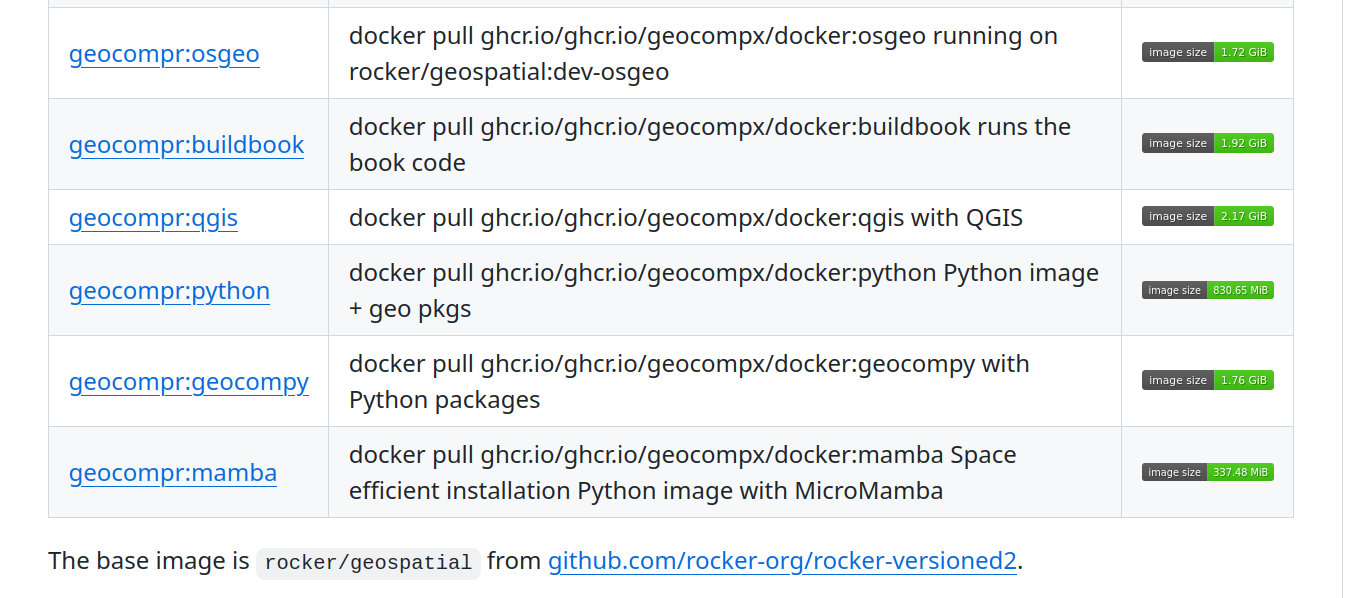
Containerisation 2
Source: pangeo-data/pangeo-docker-images
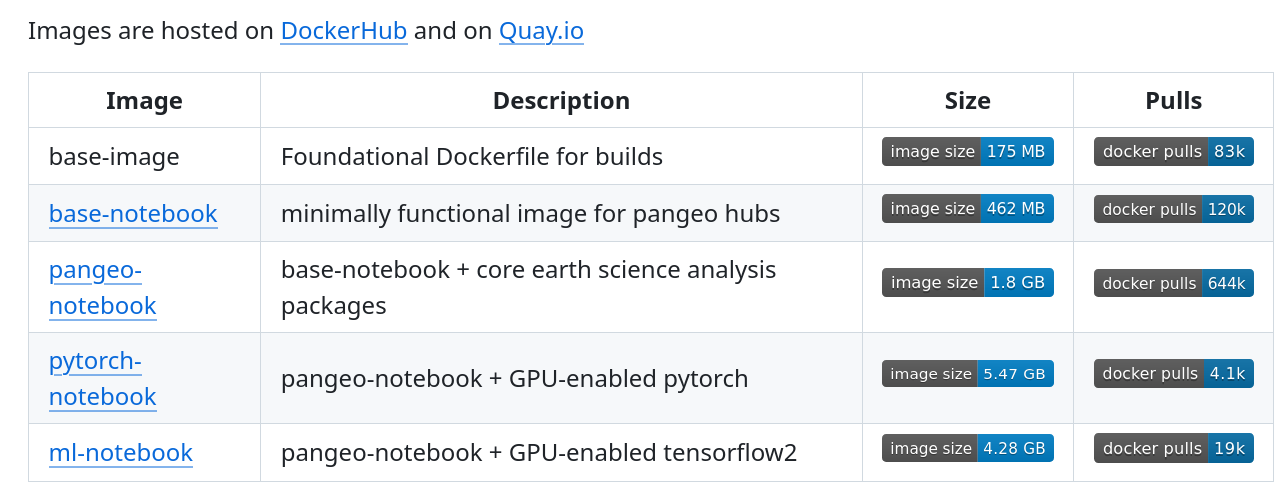
Containerisation 3
Source: https://github.com/b-data

bdata: All images
| R | Python | Jupyter Hub | Jupyter Lab | code‑server (Code) | RStudio | Neovim | Git | Git LFS | Pandoc | CRAN date | Linux distro |
|---|---|---|---|---|---|---|---|---|---|---|---|
| 4.4.1 | 3.12.6 | 5.1.0 | 4.2.5 | 4.92.2 (1.92.2) | 2024.04.2+764 | 0.10.1 | 2.46.1 | 3.5.1 | 3.2 | Debian 12 | |
| 4.4.0 | 3.12.4 | 5.0.0 | 4.2.2 | 4.90.0 (1.90.0) | 2024.04.2+764 | n/a | 2.45.2 | 3.5.1 | 3.1.11 | 2024‑06‑14 | Debian 12 |
| 4.3.3 | 3.11.9 | 4.1.5 | 4.1.6 | 4.23.0 (1.88.0) | n/a | n/a | 2.44.0 | 3.5.1 | 3.1.11 | 2024‑04‑24 | Debian 12 |
| 4.3.2 | 3.11.8 | 4.0.2 | 4.1.2 | 4.21.2 (1.86.2) | n/a | n/a | 2.44.0 | 3.4.1 | 3.1.11 | 2024‑02‑29 | Debian 12 |
| 4.3.1 | 3.11.6 | 4.0.2 | 3.6.6 | 4.18.0 (1.83.1) | n/a | n/a | 2.42.0 | 3.4.0 | 3.1.1 | 2023‑10‑31 | Debian 12 |
| 4.3.0 | 3.11.4 | 4.0.1 | 3.6.4 | 4.13.0 (1.78.2) | n/a | n/a | 2.41.0 | 3.3.0 | 3.1.1 | n/a | Debian 12 |
| 4.2.3 | 3.10.11 | 4.0.0 | 3.6.3 | 4.9.1 (1.73.1) | n/a | n/a | 2.40.0 | 3.3.0 | 2.19.2 | n/a | Debian 11 |
| 4.2.2 | 3.10.10 | 3.1.1 | 3.6.1 | 4.9.1 (1.73.1) | n/a | n/a | 2.40.0 | 3.3.0 | 2.19.2 | n/a | Debian 11 |
| 4.2.1 | 3.9.2 | 2.3.1 | 3.5.0 | 4.8.1 (1.72.1) | n/a | n/a | 2.38.1 | 3.2.0 | 2.19.2 | n/a | Debian 11 |
| 4.2.0 | 3.9.2 | 2.3.1 | 3.4.3 | 4.4.0 (1.66.2) | n/a | n/a | 2.36.1 | 3.2.0 | 2.18 | n/a | Debian 11 |
bdata: verse+ images
| R | CTAN date | Quarto |
|---|---|---|
| 4.4.1 | 1.5.57 | |
| 4.4.0 | 2024‑06‑14 | 1.4.555 |
| 4.3.3 | 2024‑04‑24 | 1.4.553 |
| 4.3.2 | 2024‑02‑29 | 1.4.550 |
| 4.3.1 | 2023‑10‑31 | 1.3.450 |
| 4.3.0 | 2023‑06‑16 | 1.3.361 |
| 4.2.3 | 2023‑04‑21 | 1.2.475[^1] |
| 4.2.2 | 2023‑03‑15 | 1.2.335[^1] |
| 4.2.1 | 2022‑10‑31 | 1.1.251[^1] |
| 4.2.0 | 2022‑06‑23 | n/a |
bdata: qgisprocess images
| R | QGIS | SAGA | OTB[^1] |
|---|---|---|---|
| 4.4.1 | 3.38.3 | 9.1.3 | 9.0.0 |
| 4.4.0 | 3.36.3 | 9.1.3 | 9.0.0 |
| 4.3.3 | 3.36.2 | 9.1.3 | 9.0.0 |
| 4.3.2 | 3.36.0 | 9.1.3 | 8.1.2 |
| 4.3.1 | 3.34.0 | 9.1.3 | 8.1.2 |
| 4.3.0 | 3.30.3 | 8.5.0 | 8.1.1 |
| 4.2.3 | n/a | n/a | n/a |
| 4.2.2 | n/a | n/a | n/a |
| 4.2.1 | n/a | n/a | n/a |
| 4.2.0 | n/a | n/a | n/a |
bdata: demo
Source: https://github.com/b-data/jupyterlab-r-docker-stack/tree/main?t ab=readme-ov-file
Rocker images (on which geocompx docker builds):
The Docker images built from this repository describe the software installation method in standalone scripts rather than directly in the Dockerfiles. These files are under the scripts directory, and these files are copied in all Docker images, under a top-level /rocker_scripts directory. This allows users to extend images by selecting additional modules to install on top of any pre-built images.
E.g.
FROM rocker/rstudio:4.0.0
RUN /rocker_scripts/install_python.sh
RUN /rocker_scripts/install_julia.shCross-language pain points
Too many options: IDE
- VSCode is market leader with strong community
- Pro: many extensions
- Pro: Live Share
- Pro: GitHub integration (including copilot)
- Pro: devcontainers work out-of-the-box
- Con: setup time, can be intimidating
- Positron
- Pro: More batteries included
- Con: Missing great VSCode features (e.g. Live Share)
- Con: Early days, fewer developers
- Thought: why didn’t they put energy into great extensions for modularity?
- RStudio, Jupyter Lab, Zed, …
Resource requirements
- Each new environment can take up a few GB of space
- Lack of shared binaries, could be overcome by pixi and judicious use of Docker containers
- Headspace requirements of learning new syntax and quirks
Cross-language priorities
Interactive session
- What would your top ask be to use multiple languages in a single session?
- What would you like to see in a shared environment, e.g. pixi (see )
Bonus: cross-language publishing
Quickstart: .devcontainer in GitHub codespaces
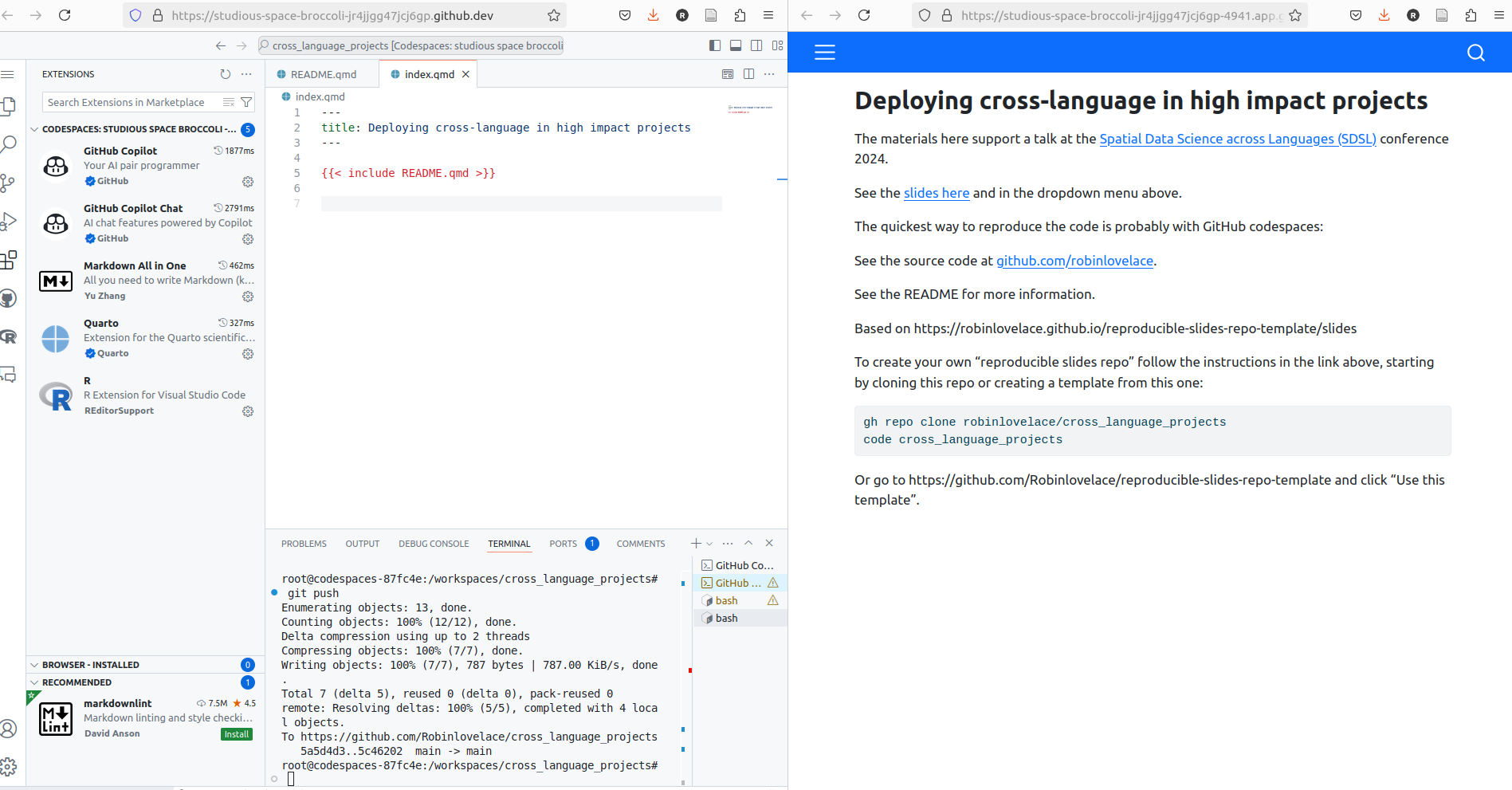
Cross-language tabsets
::: {.panel-tabset group="language"}
...
:::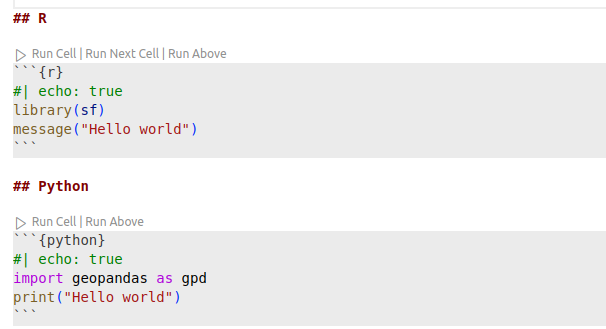
Output
Setting-up gh-pages branch
You can do this with a single quarto command:
Which leads to the following text and eventually auto-opens the deployed webiste!

The website
The previous command creates a gh-pages branch with the slides in the docs folder. This is then automatically deployed to GitHub Pages, and the website is opened in your browser when ready:
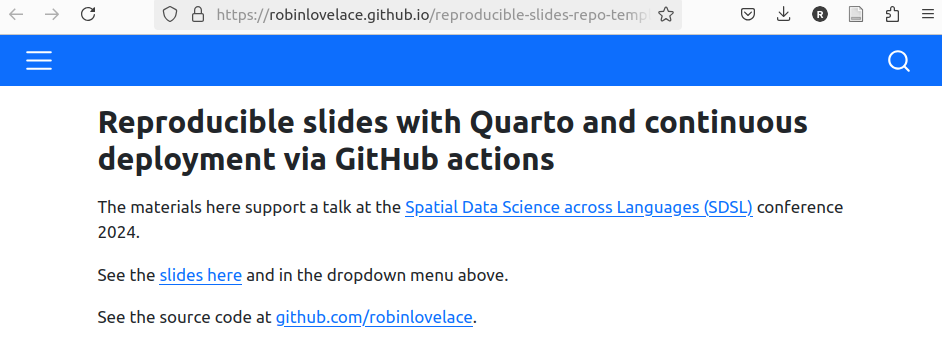
How awesome is that?
🤯🤯🤯
Debugging
Source of quarto publish gh-pages hint: Error message from GitHub Actions when trying to publish slides to GitHub Pages:
ERROR: Unable to publish to GitHub Pages (the remote origin does not have a branch named "gh-pages". Use first `quarto publish gh-pages` locally to initialize the remote repository for publishing.)
Adding citations
With the Quarto extension
- You need to be in Visual Editor mode (Ctrl+Shift+F4)
- Then it’s Ctrl+Shift+F8
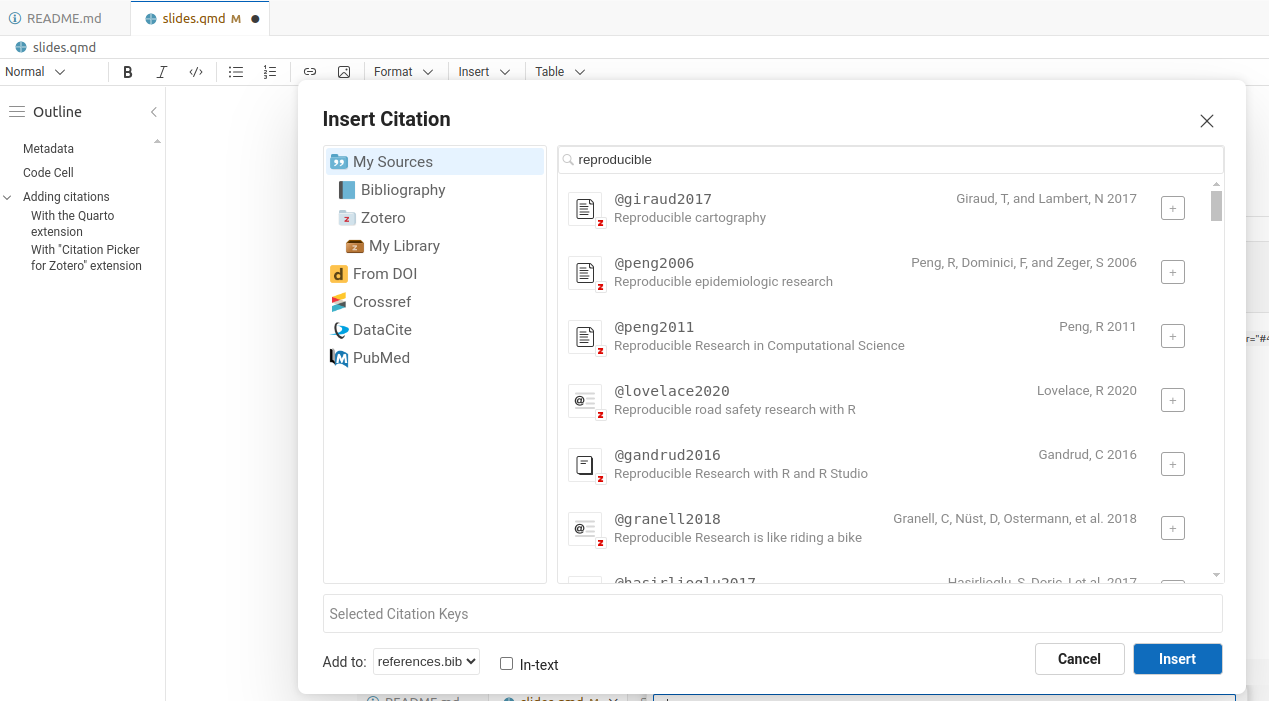
Creates citations like this: (Peng 2011)
With “Citation Picker for Zotero” extension
- Issue with this approach: doesn’t generate the .bib file
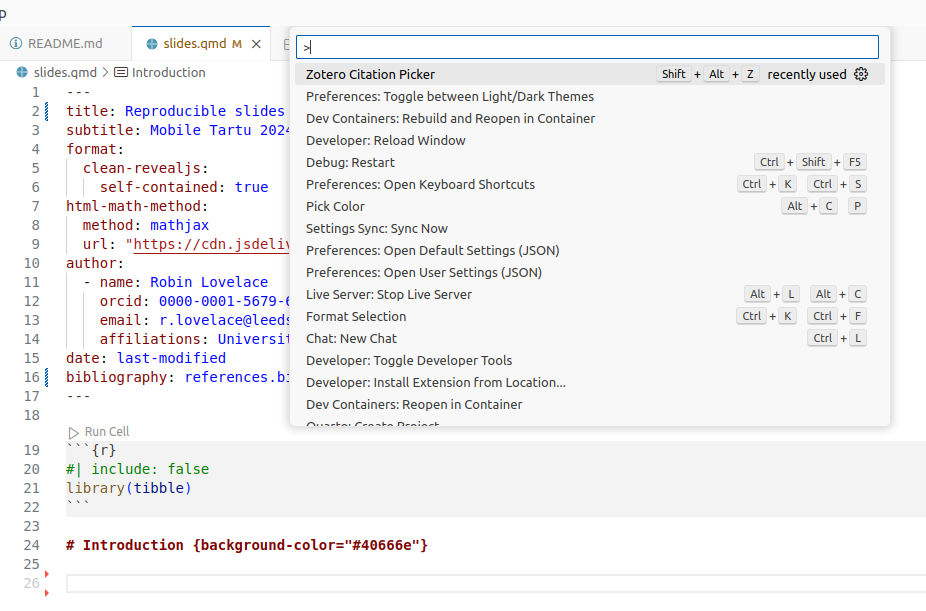
Alt+Shift+Z
Support in IDEs
